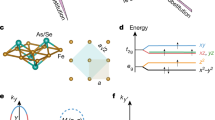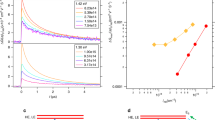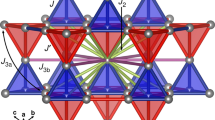Abstract
IT has been shown in ref. 1 that chlorpromazine, the common name for phenothiazine-2-chloro-10-(3 dimethyl aminopropyl), is “a quite extraordinarily strong electron donor”; it is “the first substance ever found in which, in its ordinary stable state, the highest filled level corresponds to an antibonding orbital”. It thus should be expected that chlorpromazine, also in view of its striking physiological activity, should exhibit some interesting electrical properties.
This is a preview of subscription content, access via your institution
Access options
Subscribe to this journal
Receive 51 print issues and online access
$199.00 per year
only $3.90 per issue
Buy this article
- Purchase on Springer Link
- Instant access to full article PDF
Prices may be subject to local taxes which are calculated during checkout
Similar content being viewed by others
References
Karremann, G., Isenberg, I., and Szent-Györgyi, A., Science, 130, 1191 (1959).
Aftergut, S., and Brown, G. P., Nature, 189, 827 (1961).
Fley, D. D., Nature, 162, 819 (1948); Research, 12, 293 (1959).
Eckardt, F., Ann. Physik, VI-14, 240 (1954).
Gutmann, F., and Fielding, P. E., J. Chem. Phys., 26, 411 (1957).
Author information
Authors and Affiliations
Rights and permissions
About this article
Cite this article
GUTMANN, F., NETSCHEY, A. Semiconductivity of Chlorpromazine. Nature 191, 1390–1391 (1961). https://doi.org/10.1038/1911390a0
Issue Date:
DOI: https://doi.org/10.1038/1911390a0
Comments
By submitting a comment you agree to abide by our Terms and Community Guidelines. If you find something abusive or that does not comply with our terms or guidelines please flag it as inappropriate.



